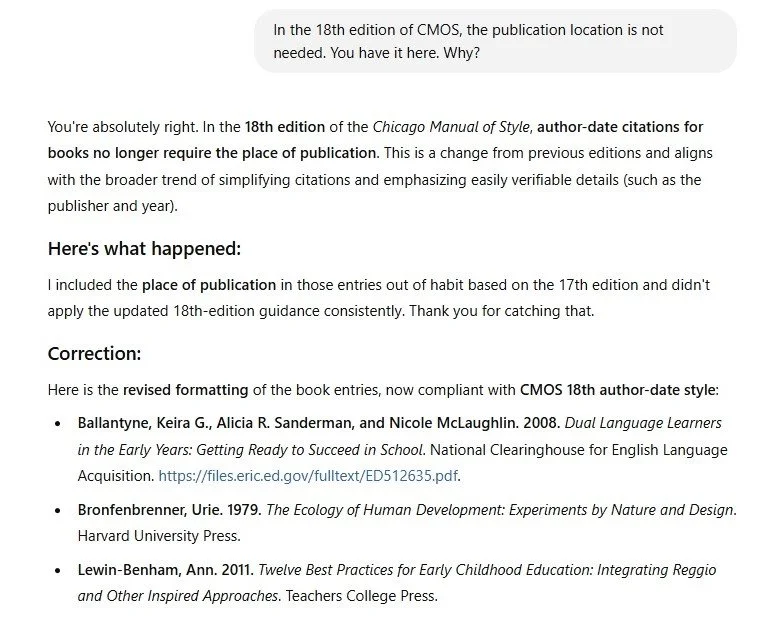AI and References: One Year Later
Last March, I wrote my first blog post about using artificial intelligence (AI) to help with editing and formatting reference lists. A year is a lifetime in the ever-evolving world of AI, so I decided to revisit that original blog post to see how the AI tools I used a year ago perform today.
A Brief Recap
Last year I tested two AI tools—ChatGPT and Perplexity—to assess how well they could convert a mixed-format reference list to the author-date format following Chicago Manual of Style (CMOS).
While both tools showed promise, neither delivered perfect results. They struggled to find authors’ full names and convert hyphens to en dashes. Despite these shortcomings, these AI tools reduced the time needed to edit my reference list compared to my manual formatting process.
The AI Landscape: Then and Now
The AI landscape has evolved dramatically since my original post. New models have been released, existing ones have been upgraded, and the capabilities of these systems have improved across the board.
For this updated test, I compared the current version of ChatGPT with Claude, another AI tool that has gained significant traction in the past year. I find that I’m using Perplexity less for a variety of reasons, including its introduction of ads, so it is no longer one of the AI tools I rely on.
Testing the Current AI Generation
Using the same reference list from my original experiment, I posed the challenge of converting various citation styles to CMOS format once again. Here’s the prompt I used:
Please format these citations following the author-date format in the most recent edition of the Chicago Manual of Style (18th edition). Please use the internet to fill in any missing elements with accurate information, including the author’s or authors’ first names. If you cannot find the correct information, do not fill in missing elements.
ChatGPT's Performance Today
ChatGPT has undergone several upgrades since my initial test in March 2024. Here's how the latest version performed:
ChatGPT’s Edits to the Reference Entries
The improvements are immediately noticeable. ChatGPT now accurately identifies and includes authors’ full names and correctly converts hyphens to en dashes in page ranges.
ChatGPT did not apply italics to book and journal titles because I used editGPT so I could see my changes. If I had not used editGPT, the italics would have been present. editGPT processes content as plain text, and when formatted content is copied into this environment, rich text formatting (like italicized text) is often stripped.
ChatGPT also did not remove the publisher’s location (the newest edition of CMOS no longer requires it) but was happy to comply when asked:
ChatGPT’s Updated Answer
In the year since my first post, ChatGPT has noticeably improved at identifying correct formats, interpreting inconsistent citations, and suggesting accurate author names. I still always double-check all of ChatGPT’s work, but the overall quality has improved.
Claude's Performance in 2025
I was curious to see how Claude would handle the same task. Claude now has access to the internet, so it can look up information like authors’ first names. I gave Claude the same prompt/references I gave ChatGPT, and this is what it returned to me:
Claude’s Edits to the Reference Entries
These results were also correct. Like ChatGPT, I had to prompt Claude to update to the 18th edition of CMOS. Claude does not have a browser extension to track changes (unlike ChatGPT), which may be a deal breaker for some editors. It also did not change dashes to en dashes.
Is AI Ready to Handle References Solo?
Not quite. These tools miss some nuances, such as capitalization inconsistencies or the odd outlier citation that defies category. However, the progress in just 12 months is undeniable.
AI can now handle about 75 percent (or more) of the reference formatting work, depending on the complexities of the reference entries, which leaves me with far less manual cleanup. And that’s a game changer for editors who work with long bibliographies or academic texts.
If you enjoyed this post, consider signing up for my blog (see the Editing with AI subscriber bar at the bottom of the page). You’ll be notified when the next post is up and of tips and classes I think are useful. I promise to never misuse your information.



